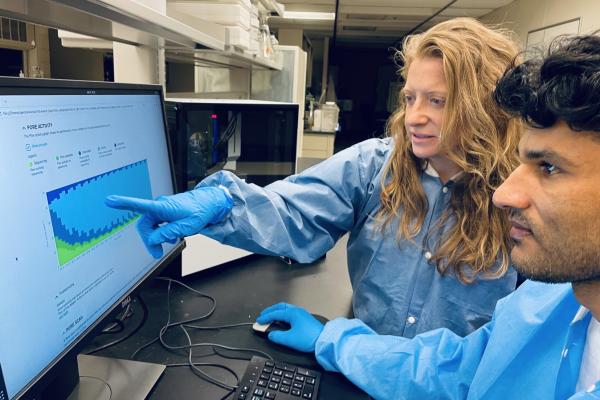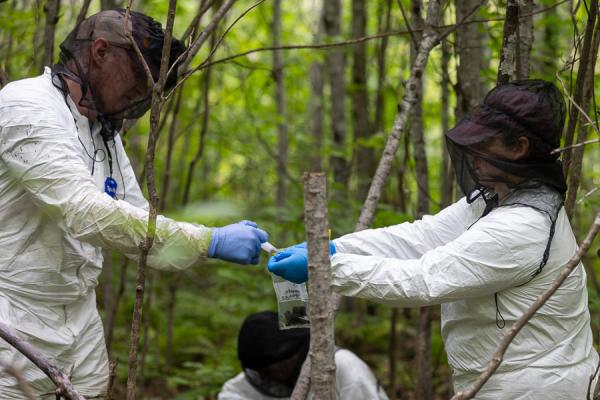CVM Graduate Seminar Series, Spring 2023 Highlights
April 27, 2023

The Spring 2023, CVM Graduate Student Seminar series allows postdoctoral students and graduate students the opportunity to share their research with their peers, faculty, and staff. We recently reached out to the VBS postdocs and graduate students who gave presentations for this seminar.

January 19, 2023, Lexi Frank, Advised by VBS Assistant Professor Peter Larsen
Title: “Nanopore Adaptive Sampling as a Rapid Mammalian Molecular Barcoding Tool”
Summary: My talk is focused on some recent Oxford Nanopore sequencing projects that myself and my lab have been working on. We use a technique called adaptive sampling with our Nanopore runs to enrich sequencing of the targets of our studies. To be able to identify species of a particular mammalian sample, we want to target the mitochondrial genome for enriched sequencing. One project that I will present on uses fecal samples from Minnesota mammals to sequence and identify the mammal species. With this technique, we can identify the species more rapidly than other techniques like PCR or fecal morphology while additionally producing sequencing data. Using this method with fecal samples could be really useful for conservation, biodiversity and disease surveillance studies because you can identify mammals very quickly without having to handle them or even see them. For another project, we used Nanopore adaptive sampling with our mobile lab in Guyana, South America to identify peridomestic mammal species. All DNA extraction, sequencing, and bioinformatics were done in the field. We were able to identify species of bats, rodents, and marsupials within 36 hours of sample collection. With traditional PCR-based methods in the lab, this typically takes months. This work is the first step to eventually providing pathogen and virome data from these mammals to understudied geographic regions and the communities within them. I am hoping to continue working both in the lab and in the field to provide data related to pathogen surveillance and mammal ecology.

February 2, 2023, Manci Li, Advised by VBS Assistant Professor Peter Larsen
Title: “Single-cell sequencing of entorhinal cortex reveals widespread disruption of neuropeptide networks in Alzheimer’s Disease”
Summary: Abnormalities of neuropeptides (NPs) that play important roles in modulating neuronal activities are commonly observed in Alzheimer’s Disease (AD). We hypothesized that NP network disruption is widespread in AD brains. We used existing data and bioinformatic analysis to find that 1) the proportion of cells expressing NPs but not their receptors decreased significantly in AD; 2). neurons expressing higher levels and greater diversity of NPs were disproportionately absent in AD; 3) increased age coincides with decreased ADNP expression in the hippocampus. In the future, we expect to see experiments proving that 1) neurons expressing more NPs may be selectively vulnerable to AD; 2) decreased expression of NPs participates in early AD pathogenesis. We also predict that the NP network can be harnessed for treatment and/or early diagnosis of AD.

April 27, 2023, Dr. Fernanda Fumuso, Advised by VBS Associate Professor Roberta O'Connor
Title: “Determining the pharmacokinetics and pharmacodynamics of TartrolonE against
Cryptosporidium parvum”
Summary: During the seminar I will be presenting my PhD research project, focused on the evaluation and elucidation of the pharmacodynamic and pharmacokinetics of Tartrolon E (TrtE). This is a natural compound produced by Teredinibacter turnerae T7901, a symbiotic bacteria that resides in the gills of shipworms. This compound has proven to be effective against different parasites of the apicomplexan phylum including Cryptosporidium parvum. The parasite can cause from asymptomatic disease to life threatening conditions among immunosuppressed adults and young children. Moreover, the pathogen causes disease in neonatal ruminants with nutritional consequences and high economical losses on productive species. This, together with the lack of an effective treatment against this agent generates the necessity for new and effective therapeutic drugs against Cryptosporidium parvum. Thus, the focus of my research would be to acquire knowledge about the pharmacodynamic and pharmacokinetics of TrtE both in-vitro and in-vivo, that would take the compound one step closer to optimizing dosing regimens to use TrtE efficiently against the parasite.


